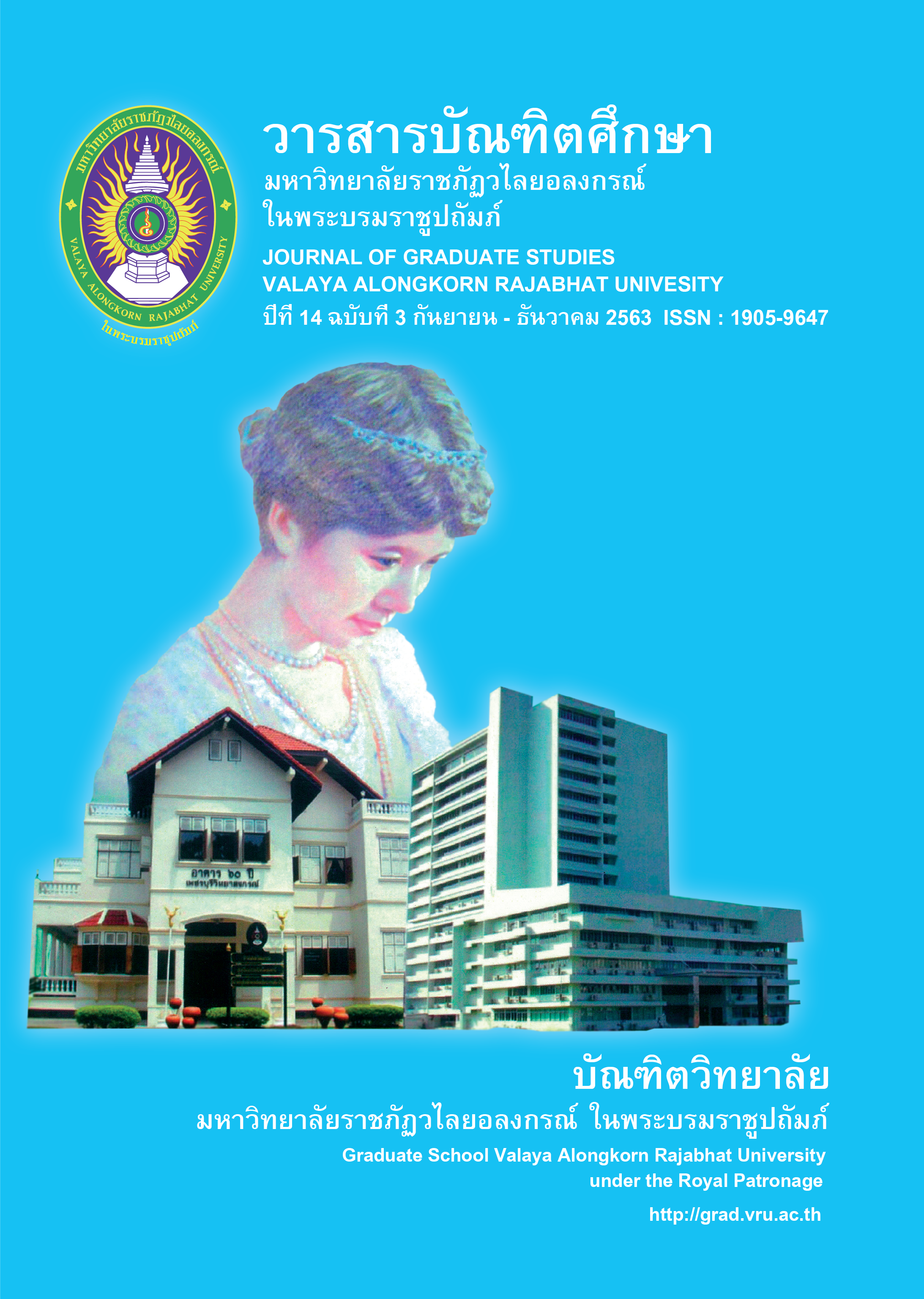THE DEVELOPMENT OF LEARNING MANAGEMENT PROCESS TO ENHANCE STUDENT TEACHER’S CHARACTERISTIC FOR CHANDRAKASEM RAJABHAT UNIVERSITY IN THAI EDUCATION 4.0 ERA
Main Article Content
Abstract
The purposes of this research were 1) to analyze student teacher’s desirable characteristics in Thai education 4.0 era, 2) to develop learning management process that enhance teacher characteristics of students, and 3) to study the effectiveness of learning management process that enhance teacher characteristics of students. The sample were 72 and 26 students in the 3rd year registered in the 1st and 2nd semester of the academic year 2018 respectively, which were obtained by cluster random sampling. Using one group pretest-posttest design. The research instruments were interview form, group conversation record, learning plan, self-knowledge assessment form, reflective thinking skills assessment form, multilingual language assessment, digital skills assessment, fun learning management skills assessment which has a consistency index (IOC) of 0.67-1.00, multiple choice test has the reliability of 0.85 and the teacher spirit test has confidence values of 0.83. The data analysis used content analysis, percentage, mean, distribution coefficient, standard deviation and T-test.
Research results found that: 1) the student teacher’s characteristic, there are 3 aspects namely smart teachers, good teachers with professional skills in line with the CRU-Ed Model. 2) The learning management process that enhances the teacher characteristics of students, Chandrakasem Rajabhat University in the Thai education 4.0 era. Consists of 3 steps: Step 1; Learning result analysis. Step 2; Learning management there are 8 sub-steps, namely 2.1) Checking prior knowledge (Elicitation), 2.2) stimulating interest (Engagement), 2.3) surveying and searching (Exploration), 2.4) explanation and conclusion (Explanation), 2.5) knowledge expansion (Elaboration), 2.6) evaluation, 2.7) extension, and 2.8) exhibition. Step 3; Summary and evaluation. And 3) effectiveness of the learning management process are as follows: 1) the smart teacher is to create knowledge in the content and reflecting the learning outcomes of students after learning significantly higher at the level of .05. 2) The good teacher, the post-secondary education teacher spirit increased significantly with the level of .05. 3) Regarding teachers have professional skills, which are cutting-edge learning management, such as digital skills, multi-language skills, and having fun learning management skills after learning is significantly higher at the level of .05.
Article Details

This work is licensed under a Creative Commons Attribution-NonCommercial-NoDerivatives 4.0 International License.
บทความทุกเรื่องได้รับการตรวจความถูกต้องทางวิชาการโดยผู้ทรงคุณวุฒิ ทรรศนะและข้อคิดเห็นในบทความ Journal of Global of Perspectives in Humanities and Social Sciences (J-GPHSS) มิใช่เป็นทรรศนะและความคิดของผู้จัดทำจึงมิใช่ความรับผิดชอบของบัณฑิตวิทยาลัย มหาวิทยาลัยราชภัฏวไลยอลงกรณ์ ในพระบรมราชูปถัมภ์ กองบรรณาธิการไม่สงวนสิทธิ์การคัดลอก แต่ให้อ้างอิงแหล่งที่มา
References
Bloom, B. S. (1956). Taxonomy of Education Objective. New York: David Mckay.
Chandrakasem Rajabhat University Council. (2017). kān prap yutthasāt mahāwitthayālai rātchaphat čhanthra kasēm sū khwāmpen lœ̄t [Reprofiling of Chandrakasem Rajabhat University for excellence]. Bangkok: Chandrakasem Rajabhat University Press.
Dachakupt, P. et al. (2017). thaksa čhet C khō̜ng khrū 4.0 [Teachers’ 7c Skill 4.0 Era]. Bangkok: Chulalongkorn University Press.
Degener, J. (2018). Multilanguage. Retrieve from https://www.goethe.de/ins/th/ Multilanguage.
Gagnon, G. W. and Collay, M. (2001). Designing for learning. Six Elenmentsin Constructivist Classrooms. Thousand Oaks: Corwin Press Inc.
Glasser, R. (1965). Teaching Machine and Program Learning II. Pittsburg: University of Pittsburgh Press.
Johns, C. (2004). Becoming a reflective practitioner. Oxford: Blackwell.
Khammani, T. (2018). sāt kānsō̜n: ʻongkhwāmrū phư̄a kānčhat krabūankān rīanrū thī mī prasitthiphāp [Science of teaching for learning Management Efficiency]. Bangkok: Chulalongkorn University Press.
Kittiyanusun, P. (2009). kān songsœ̄m kān rīanrū dūai tonʻēng khō̜ng nisit : kān sathō̜n čhāk krabūankān wičhai patibatkān [Promoting Self - directed Learning of Student Teachers: Reflection Through Action Research]. Journal of education and Social Development. 5(1-2), 145 – 166.
Klausmeier, H. J. (1985). Educational psychology. (5th ed.) New York: Harper & Row.
Maslow, A. H. (1962). Toward a psychology of being. New York: D Van Nostrand Co. Inc.
Matekul, P. (2016). kānpramœ̄n khwāmtō̜ngkān čhampen nai kānphatthanā kārū thaothan sư̄ dičhithan læ phrưttikam kānchai sư̄ dičhithan nai kānčhatkān rīanrū kǣ phū rīan khō̜ng naksưksā wichāchīp khrū [Need assessment for developing digital literacy and digital media utilization behavior for instruction of student teachers]. Doctoral dissertation. Srinakharinwirot University.
National Science and Technology Development Agency. (2018). kān rū dičhithan (Digital Literacy) [Digital literacy Learning]. Retrieved from https://www.nstda.or.th.
Office of Secretary Teachers’ Council. (2018). khō̜bangkhap khuru saphāwā dūai māttrathān wichāchīp thāngkān sưksā Phō̜.Sō̜. sō̜ngphanhārō̜ihāsiphok [Teachers’ Council Rules for Educational Professional Standard B.E. 2013]. Retrieve from https://www. Ksp.or.th.
Oupakham, P., & Chuenchaichon, Y. (2015). kānchai withī sō̜n tām thritsadī khō̜n satrakchan nit sưm phư̄a songsœ̄m khwāmsāmāt thāngkān phūt phāsā ʻAngkrit khō̜ng nakrīan sākhā wichākān thō̜ngthīeo radap prakāsanīyabat wichāchīp [Implementation of Constructionism Learning Theory to Promote English Speaking Ability of Vocational Students Majoring in Tourism]. Lampang Rajabhat University Journal. 4(2), 115 – 123.
Pandee, P. (2016). kānphatthanā rūpbǣp kān rīanrū sāngsan dūai panyā phư̄a songsœ̄m khwām sāngsan samrap naksưksā khrū [Development of Constructionist Learning Model to Promote Creativity for Teacher-College Students]. Doctoral dissertation. Silpakorn University.
Panich, V. (2012). withī sāng kān rīanrū phư̄a sit nai satawat thī yīsipʻet mūnnithi sot sī - sarit wong [Constructive learning way for disciple in 21 century. Sodsri-Saridwong Foundation]. Bangkok: Tathata Ltd. Press.
Papert, S. (1990). An Introduction to the 5th Anniversary Collection. In Harel, I. (Ed.). Constructionist Learning: A 5th Anniversary Collection of Papers. Cambridge, MA: MIT Media Laboratory.
Phutthathat, P. (2004). tham samrap khrū khambanyāi phra thēp wi sutthi Mēthī (Phutthathāt Phikkhu) Na sūan mōkkhaphalārām ʻamphœ̄ Chaiya čhangwat surātthānī wan thī sī - yīsipkāo Kanyāyon Phō̜.Sō̜. sō̜ngphanhārō̜isīsipčhet [Moral for teacher. Phathapvisuttimatee’s lecture. Mokaplaram garden. Surat tani. 4-29 september 2004]. Bangkok: Ministry of education.
Rajabhat University Act. (2004). Rātchakitčhānubēksā [Rachakidganubeksa]. 121(Spacial section 23), 2.
Russell, M. (2000). Summarizing Changes in Test Score: Shortcomings of Three Common Method Practical Assessment. Research and Evaluation. Retrieve from http://pareonline.net/getvn.asp?v=7&n=5.
Sinlalat, P. (2019, August, 23). Interview by Tammawoharl, S. [Tape recording].
Tyler, R. W. (1950). Basic Principles of Curriculum and Instruction. Chicago: The University of Chicago press.
White. R. (2019). Children’s Edutainment Center: Learning through Play. Retrieve from https://www.whitehutchinson.com.


